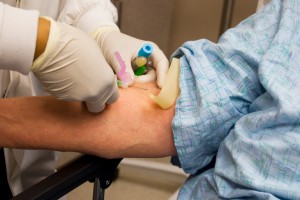 Diagnosing mesothelioma in its early stages offers a number of benefits. Early detection offers better treatment options, better quality of life, and better survival rates. Because mesothelioma is often diagnosed in its later stages, the average survival time for mesothelioma victims (post-diagnosis) is 4 to 30 months. Although the medical landscape offers few incontrovertible studies for average survival rates for patients diagnosed in the earlier stages (1 and 2) of mesothelioma, some studies report that early stage patients survive for 38 months or more, while others report 5 years or more.
Diagnosing mesothelioma in its early stages offers a number of benefits. Early detection offers better treatment options, better quality of life, and better survival rates. Because mesothelioma is often diagnosed in its later stages, the average survival time for mesothelioma victims (post-diagnosis) is 4 to 30 months. Although the medical landscape offers few incontrovertible studies for average survival rates for patients diagnosed in the earlier stages (1 and 2) of mesothelioma, some studies report that early stage patients survive for 38 months or more, while others report 5 years or more.
According to Dr. Harvey I. Pass, Professor of Thoracic Oncology at NYU Langone Medical Center, and colleagues, patients with stage IA disease can survive five or more years with prompt surgery to remove the tumor. Further, a recent collection of survivor stories shows an even wider survival range of 5 years up to 12+ years for patients diagnosed at stages 1 and 2.
Still, early detection of mesothelioma has always been a great challenge for the medical community and research scientists alike. Because it takes anywhere from 10 to 60 years for symptoms of asbestos exposure to develop, most victims are diagnosed in the later stages of the disease—and later in life. In fact, because of the long latency period and lack of readily available early detection tests, people over the age of 50 are most commonly affected. Fortunately, several tests now have tremendous potential to change how and when mesothelioma victims are diagnosed.
Path to Early Detection Test for Mesothelioma
In October of 2005, the University of Pennsylvania-Perlman School of Medicine, in collaboration with MedPage Today.com, published an article stating that the “discovery of a biomarker that reveals pleural mesothelioma at an early stage may lead to a blood test that can detect this asbestos-related lung malignancy for meaningful therapy.” The study that prompted the discovery was conducted by Dr. Pass.
The study revealed that “patients with pleural mesothelioma had significantly higher serum levels of the protein osteopontin, compared with those who had been exposed to asbestos but did not have the disease,” according to Pass.
On October 3, 2012, SomaLogic reported that “a multi-institute team of researchers led by scientists at the NYU Langone Medical Center and SomaLogic, Inc., announced {today} the discovery and validation of a panel of 13 blood-based protein biomarkers that can detect malignant mesothelioma in even the early stages of this rare but deadly cancer.”
Shortly after, a study authored by Dr. Pass was featured in the October 11, 2012 issue of the New England Journal of Medicine (NEJM). The study revealed that a combination of a blood test and lung fluid test could detect mesothelioma in its early stages. The tests help detect a protein in plasma called fibulin-3 (biomarker). According to Pass, in the mesothelioma patients, fibulin-3 was four to five times higher than in asbestos-exposed individuals.”
Today, SomaLogic—a privately held protein biomarker discovery and clinical diagnostics company based in Boulder, Colorado, is receiving accolades for the new test it developed for the Early Detection Research Network Biomarker Discovery Lab of the National Cancer Institute. During testing, the biomarker test accurately identified an impressive 80 percent of malignant mesothelioma cases. According to Dr. Pass, the test “can definitively identify proteins secreted from cancerous tumors caused by asbestos exposure.”
November 2013. The most recent study, published just a few months ago in the Clinical Proteomics Journal also confirms the effectiveness of the test. As of February 2014, the remarkable SomaLogic test was still undergoing additional evaluation and modifications to further increase its accuracy.
If you or someone you know have been exposed to asbestos contact a doctor immediately—even if no symptoms are present. For more information about mesothelioma, request a free copy of 100 Questions & Answers About Mesothelioma or contact the legal team at MRHFM at 866-373-5000. MRHFM is the largest firm exclusively devoted to helping mesothelioma victims and their families.
Sources
American Cancer Society
Cancer.org
Cancer Research UK
CancerResearchUK.org
Encyclopedia Britannica, Merriam-Webster Dictionary
Merriam-Webster.com
MRHFM Law Firm
MRHFM.com
National Cancer Institute (NCI)
Cancer.gov
SomaLogic
SomaLogic.com
The New England Journal of Medicine (NEJM)
NEJM.com
University of Pennsylvania, Perelman School of Medicine & MedPage Today
Medpagetoday.com


No comments yet. You should be kind and add one!
By submitting a comment you grant Mesothelioma Blog – Information, Research, News, Answers, Legal a perpetual license to reproduce your words and name/web site in attribution. Inappropriate and irrelevant comments will be removed at an admin’s discretion. Your email is used for verification purposes only, it will never be shared.